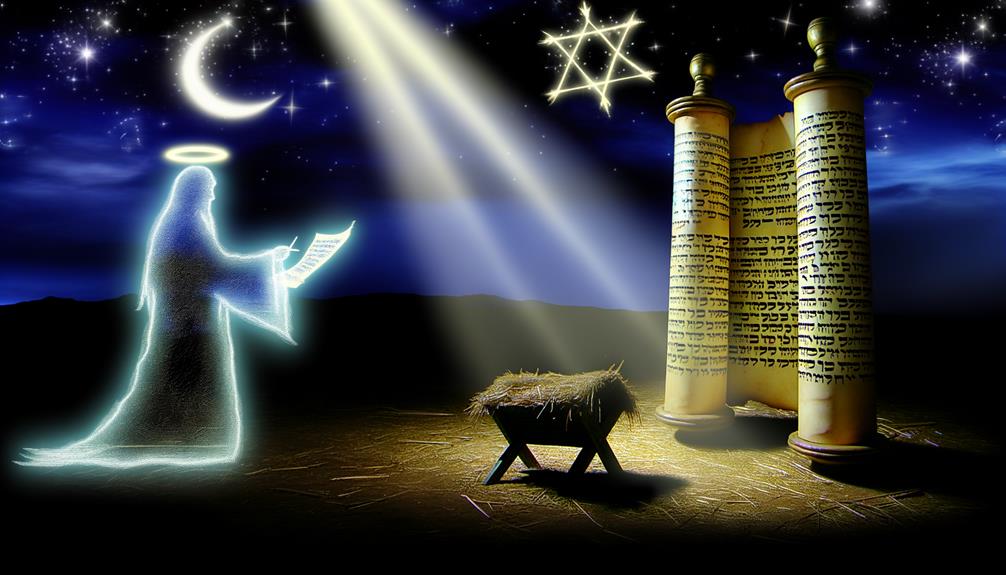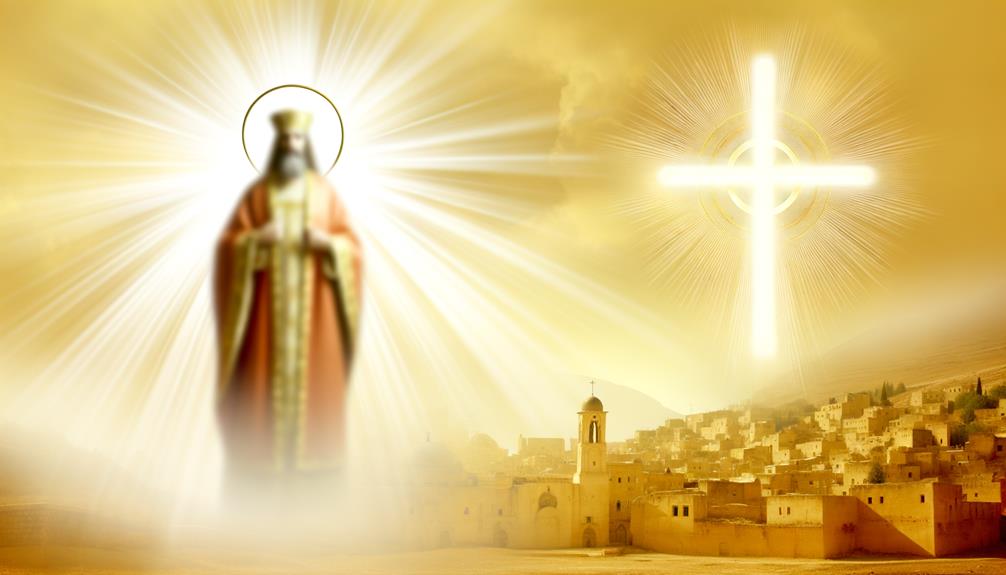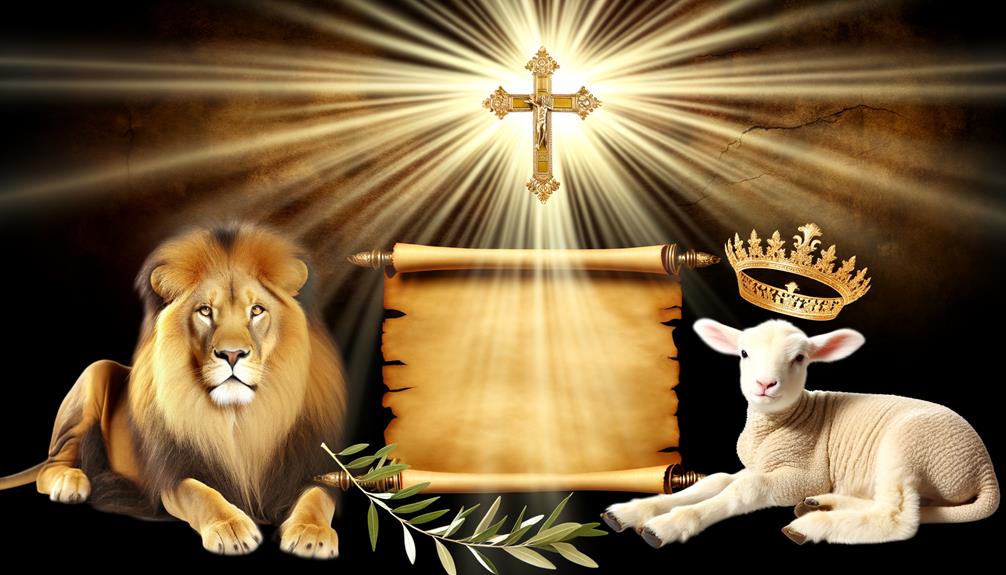Meaning of Messianic in the Bible: Prophecy Fulfilled
In biblical terms, ‘Messianic‘ pertains to the prophetic expectation of an anointed leader, the Messiah, prophesied in the Hebrew Bible. The term derives from ‘Mashiach’, meaning ‘anointed one’, indicating a divinely appointed purpose.
This figure is envisioned to restore Israel, bringing salvation, justice, and peace, as articulated by prophets like Isaiah, Jeremiah, and Daniel. Jesus is seen by Christians as the fulfillment of these prophecies, embodying the Messianic role through his life, teachings, miracles, and resurrection.
For a deeper understanding, consider exploring the critical role these prophecies play within biblical theology and their enduring influence.

Meaning of Messianic in the Bible: Prophecy, Fulfillment, and Faith
| Aspect | Description |
|---|---|
| Definition | Refers to anything related to the Messiah—God’s anointed Savior |
| Biblical Foundation | Rooted in Old Testament prophecies about a coming deliverer |
| Key Scriptures | Isaiah 53, Psalm 22, Daniel 9:25-26, John 4:25 |
| Messianic Prophecies | Foretell Jesus’ birth, suffering, death, and resurrection |
| Messianic Judaism | A movement of Jews who believe Jesus (Yeshua) is the promised Messiah |
| Faith Application | Reinforces the belief in Jesus as fulfillment of God’s redemptive plan |
Origins in the Hebrew Bible

The concept of the Messianic figure in the Hebrew Bible originates from prophetic texts that foretell the coming of a divinely anointed leader who will bring salvation and restoration to Israel.
This figure, often referred to as ‘Mashiach’ (Messiah), is depicted as a kingly or priestly personage endowed with a unique mandate from God. The term ‘Messiah’ itself derives from the Hebrew word ‘mashiach,’ meaning ‘anointed one.’ This anointing signifies a special consecration for a divine purpose.
The Messianic expectation is deeply rooted in the socio-political and spiritual turmoil experienced by Israel, providing hope for a future where justice, peace, and divine favor prevail.
This foundational concept sets the stage for subsequent Messianic prophecies and interpretations.
Prophecies of the Messiah

Numerous prophetic texts within the Hebrew Bible articulate visions of a future Messiah, whose arrival is anticipated to usher in an era of divine justice and restoration.
These prophecies, found mainly in books such as Isaiah, Jeremiah, and Daniel, outline a figure who embodies righteousness, peace, and divine authority. The following table encapsulates pivotal messianic prophecies, evoking a sense of hope and divine promise:
| Prophet | Key Prophecy | Emotional Implication |
|---|---|---|
| Isaiah | A virgin will conceive (Isaiah 7:14) | Hope for miraculous intervention |
| Jeremiah | Righteous Branch (Jeremiah 23:5-6) | Yearning for just leadership |
| Daniel | Anointed One (Daniel 9:25-26) | Anticipation of divine reign |
These prophetic declarations profoundly shape the theological landscape, promising a transformative future under the Messiah’s guidance.
Messianic Expectations

Messianic expectations in the biblical context are rooted in ancient prophecies and promises that foretold a future anointed leader who would deliver and restore Israel.
These prophecies engendered a profound sense of hope among the Jewish people, anticipating the fulfillment of divine assurances.
Analyzing these expectations provides insight into the sociopolitical and theological landscape of the era, revealing how these beliefs influenced Jewish thought and practice.
Prophecies and Promises
Ancient scriptural texts are replete with prophetic declarations and divine promises that shape the foundational expectations of the Messiah within the biblical narrative.
These prophecies and promises, dispersed throughout the Old Scriptures, offer a multifaceted picture of the anticipated Messiah. They include:
- Isaiah 53: Foretelling a suffering servant who will bear the sins of many, providing a redemptive sacrifice.
- Jeremiah 23:5-6: Predicting a righteous branch from the line of David who will reign wisely and execute justice.
These texts collectively create a theological framework within which the Messianic expectations are contextualized and understood.
Jewish Hopes Fulfilled
The fulfillment of Jewish hopes in the context of Messianic expectations is intricately tied to the interpretation and realization of the numerous prophecies embedded within the Hebrew Scriptures.
These prophecies, found in texts such as Isaiah, Jeremiah, and Daniel, articulate visions of a future anointed leader or ‘Messiah’ who would restore Israel, bring justice, and establish a reign of peace.
Historically, these expectations have been interpreted in various ways, including as a political deliverer or a spiritual redeemer.
The Jewish hopes for a Messiah encompass both the immediate deliverance from oppression and the ultimate redemption of humanity.
This dual nature underscores the complexities and depth of Messianic anticipation in Jewish thought, reflecting a profound yearning for divine intervention and restoration.
Jesus as the Messiah

Throughout the New Scripture, Jesus is consistently depicted as the fulfillment of Old Scripture Messianic prophecies, embodying the anticipated role of the Messiah in both his life and teachings. This portrayal is underscored by multiple elements:
- Prophetic Fulfillment: Jesus’ birth, ministry, and resurrection are seen as the realization of prophecies such as those found in Isaiah and Micah.
- Messianic Actions: His miracles, including healing the sick and raising the dead, are interpreted as signs of his divine authority and Messianic identity.
- Teachings and Parables: Jesus’ teachings on the Kingdom of God and his parables emphasize themes of redemption, justice, and divine love, aligning with Messianic expectations.
These aspects collectively reinforce Jesus’ identity as the Messiah.
Messianic Symbols and Titles

Various symbols and titles in the Bible serve to elucidate the complex and multifaceted identity of the Messiah.
The title ‘Son of David‘ underscores a royal lineage and fulfillment of Old Covenant prophecies.
‘Immanuel,’ meaning ‘God with us,’ emphasizes the divine presence among humanity.
Symbolic representations such as the ‘Suffering Servant‘ in Isaiah convey themes of sacrifice and redemption.
The ‘Lamb of God‘ signifies innocence and atonement, directly linking to sacrificial practices.
Each title and symbol contributes to an extensive theological framework, portraying the Messiah as both a kingly figure and a suffering redeemer.
These elements provide a deeper understanding of the Messiah’s anticipated roles, rooted in scriptural tradition and prophetic literature.
The Role of the Messiah

The Role of the Messiah in biblical theology encompasses a multifaceted array of functions, as foretold by various Old Scriptures prophecies, which predict his arrival and mission.
Central to these prophecies is the Messiah’s earthly mission, aimed at the fulfillment of divine promises and the establishment of God’s kingdom.
This mission ultimately culminates in the provision of salvation, a cornerstone theme that underscores the Messiah’s profound significance in both Jewish and Christian eschatological frameworks.
Prophecies About Messiah
Biblical prophecies about the Messiah delineate a multifaceted role encompassing both spiritual deliverance and earthly kingship. Analyzing these prophecies reveals a figure who is destined to fulfill divine promises and enact transformative change in various domains. The Hebrew Scriptures, particularly in books such as Isaiah and Daniel, articulate the Messiah’s anticipated functions.
- Spiritual Redeemer: The Messiah is prophesied to bring salvation and atonement for humanity’s sins, as seen in Isaiah 53.
- Divine Ruler: Prophecies in Daniel 7 foretell a dominion and everlasting kingdom granted to the Messiah.
These roles collectively underscore the Messiah’s profound significance.
Messiah’s Earthly Mission
In examining the Messiah’s earthly mission, one must consider the intricate interplay between his spiritual and societal roles as depicted in the biblical texts.
The Messiah is envisioned as a divinely appointed leader who fulfills prophetic promises, not only by providing spiritual guidance but also by addressing social justice. His mission encompasses healing the sick, advocating for the marginalized, and embodying divine wisdom.
This dual role underscores the holistic nature of his purpose: to restore both spiritual and communal harmony. By bridging the divine and the human domains, the Messiah embodies a unique intermediary role, facilitating a transformative impact on society while fulfilling God’s covenant.
This all-encompassing mission accentuates the Messiah’s significance beyond mere spiritual deliverance.
Salvation Through Messiah
How does the Messiah’s role as a conduit of salvation intertwine with the overarching narrative of redemption in biblical theology? Central to this narrative is the Messiah’s function as a divine agent who reconciles humanity with God. This salvific mission is pivotal in both Old and New scriptures, elucidating a transformative process that restores spiritual communion.
Key elements include:
- Atonement: The Messiah’s sacrificial death, prophesied in Isaiah and fulfilled in the Gospels, serves as the ultimate atonement for sin.
- Covenant Fulfillment: The Messiah fulfills the Abrahamic and Davidic covenants, affirming God’s promises to Israel.
This integration underscores the Messiah’s indispensable role in biblical soteriology.
Messianic Themes in Revelation

The Book of Revelation presents numerous and intricate messianic themes that underscore the anticipated fulfillment of Old Scriptures prophecies through the figure of Jesus Christ. These themes highlight the eschatological triumph of the Messiah, the establishment of His eternal kingdom, and the ultimate judgment of evil. Revelation’s rich symbolism and apocalyptic imagery serve to illustrate the final victory of Jesus, positioning Him as the Alpha and Omega.
| Theme | Description | Emotional Impact |
|---|---|---|
| Eschatological Triumph | Depicts Christ’s ultimate victory | Hope and assurance |
| Eternal Kingdom | Prophesies the reign of Christ | Joy and anticipation |
| Judgment of Evil | Foretells the end of wickedness | Relief and justice |
These themes affirm the messianic role of Jesus, providing profound theological insights into His redemptive mission.
Conclusion
The concept of the Messiah in biblical texts is a cornerstone around which a multitude of theological themes orbit.
Originating in the Hebrew Bible, the prophecies and expectations surrounding the Messiah have been pivotal in both Jewish and Christian traditions.
Jesus’ identification as the Messiah has created an unparalleled theological paradigm.
Messianic symbols, titles, and roles are explored extensively, culminating in the eschatological visions of Revelation.
The narrative of the Messiah is nothing short of divine orchestration.






